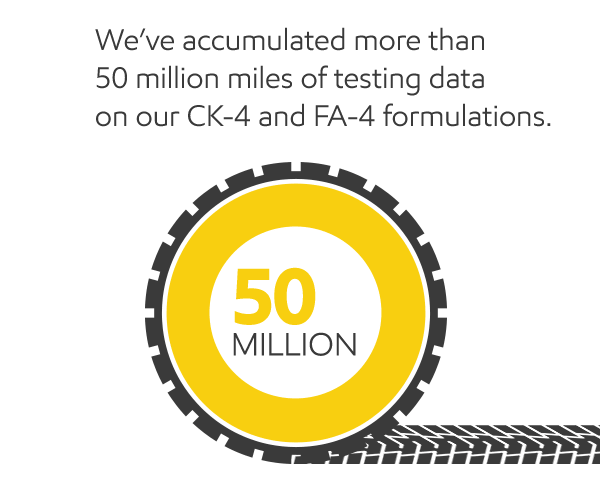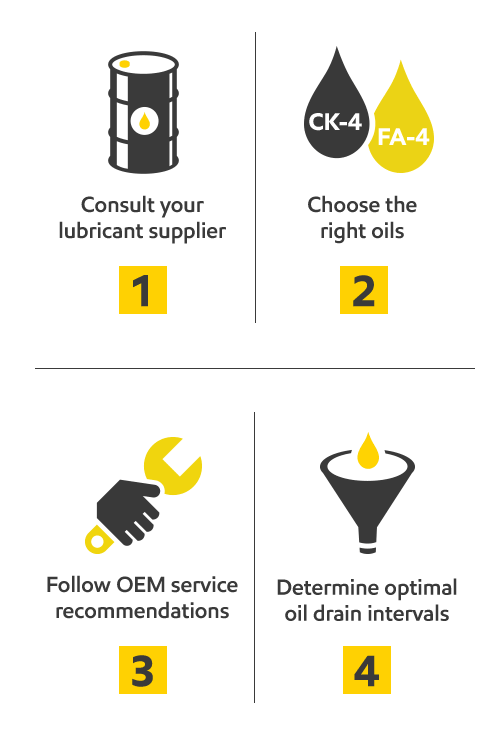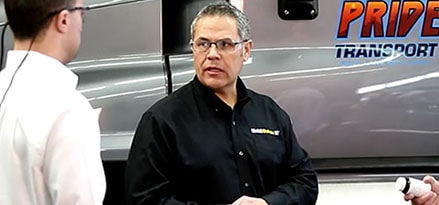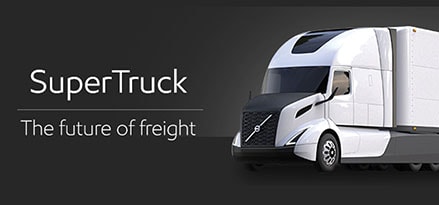API CK-4 and FA-4: Next-generation diesel engine oils
The American Petroleum Institute’s Proposed Category 12 (API PC-12) goes into effect in 2027. Taking advantage of the last decade of innovation, this new category will drive better efficiency, productivity, and reliability for the industry.
Designed to push boundaries.As a member of API, ExxonMobil had a number of technical experts play key roles in the initial development and advancement of the specification and testing parameters that led to PC-12, holding several positions on the Diesel Engine Oil Advisory Panel and TKTK Test Development Taskforce. Collaboration is an essential part of our business, and our participation in development involved scientists, engineers, drivers and fleet managers, ensuring that everyone’s needs and perspectives are factored into the decision-making.
The result is a product that can reduce nitrous oxide (Nox) emissions by 75%, particulate matter by 50%, and increase aftertreatment service life from 435k miles to 800k miles — an 83.9% improvement. Learn more about PC-12
Putting millions of miles behind CK-4 and FA-4 oils

Lubricant technology at work
CK-4 and FA-4 oils both represent an upgrade to CJ-4 oils. CK-4 oils maintain traditional high temperature/high shear (HTHS) viscosity and FA-4 oils are lower HTHS viscosity. Of the two oils, FA-4 oils focus on enhanced fuel efficiency for newer engines. However, both CK-4 and FA-4 oils help:
- Reduce carbon dioxide and greenhouse gas emissions.
- Maintain engine durability while improving oxidation resistance, shear stability and aeration control.
CK-4 or FA-4 oils will not affect every business the same way, but it’s helpful to note the success of low viscosity oils preceding them . Schneider, Lesmeister Transportation, Pride Transport, H&W Trucking, Dot Transportation and other industry leaders have relied on low viscosity oils for years to help them reach their sustainability and money-saving goals. Next-generation CK-4 and FA-4 oils can help build upon these improvements.
Still, the development of CK-4 and FA-4 wasn’t an overnight process, and, likewise, the process for choosing an oil for your fleet deserves careful consideration and planning. We recommend reaching out to your lubricant supplier and original equipment manufacturer (OEM) to ensure the best results for your business.
Switching to CK-4 and FA-4 oils

Relying on experts
For more than 90 years, we’ve been helping companies prepare for and operate under industry regulations, earning the recognition of leading on-highway trucking fleets and off-highway companies. CK-4 and FA-4 oils represent another example of how we have successfully helped our customers manage change.
We continue to work closely with fleet managers and owners of various sized fleets on a daily basis. In addition to the educational tools we’re developing, our field experts are helping fleet managers determine the right oil choices for their business.
After choosing a CK-4 and/or FA-4 oil, it’s important for fleets to determine the best maintenance solutions to help optimize oil drain intervals and protect their vehicles’ engines. We offer a four-step process for optimizing oil drain intervals. The ExxonMobil Optimized Oil Drain Interval (ODI) Process has yielded exceptional results for fleets of various sizes; we recommend this data-driven process for fleets as they implement CK-4 and/or FA-4 oils into their operations. Once a new baseline oil drain interval is in place, maintenance personnel and ExxonMobil technical experts can help assess how the oil is performing and how they can take advantage of the performance properties offered by the advanced lubricants.



